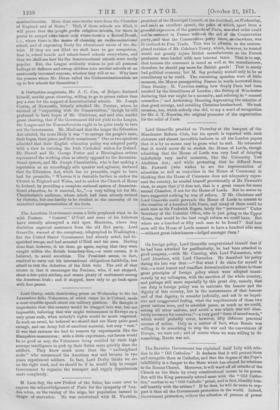A Derbyshire magistrate, Mr. 3. C. Cox. of Belper, declared
himself, amidst groat cheering, willing to go to prison rather than pay a rate for the support of denominational schools. Mr. Joseph Cowen, of Newcastle, bitterly attacked Mr. Forster, whom he accused of " coquetting with the Conservatives," though he still professed to have hopes of Mr. Gladstone, and said also, amidst great cheering, that if the Government did not yield to the League, the League and the Nonconformists ought to be quite ready to turn out the Government. Mr. Miall said that the longer the Education Act existed, the more likely it was " to corrupt the people's taste, their hopes, their peace, and their consciences." One or two speakers admitted that their English education policy was adopted partly with a view to resisting the Irish Catholics' wishes for Ireland. Mr. Howell and Mr. George Potter and a Birmingham artisan represented the working-class as utterly opposed to the denomina- tional system, and Mr. Joseph Chamberlain, who is fast making a 'reputation as an exceedingly able speaker and agitator, declared that the Education Act, which has no preamble, ought to have had for preainble, "Whereas it is desirable further to endow the Church in England and Wales, and to endow the Church of Rome in Ireland, by providing a complete national system of denomina- tional education, be it enacted, &c.,"—a very telling hit for Mr. Chamberlain's audience, whose minds had been already twisted by rhetoric, but one hardly to be rivalled in the enormity of its oratorical misrepresentation of the facts.


































 Previous page
Previous page